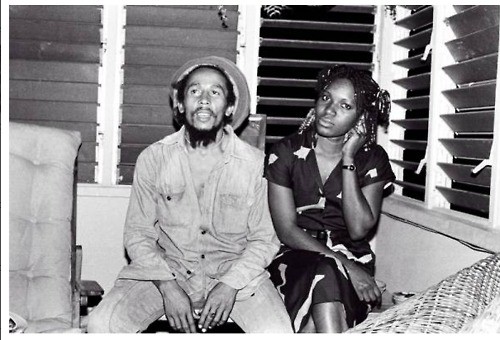Bob Marley Was Jamaica’s Most Treasured Man

A movie we watched on Saturday night brought back memories of a very important musician, one whom I at one time considered my favorite–Bob Marley and the Wailers. Directed by Kevin McDonald, the film tells the fascinating story of how this son of an English army officer named Robert Nesta Marley became the most important person in Jamaica. And the whole time he was rising to fame and playing to 100,000 fans in huge arenas, he never much thought about the money, and the fame. He thought again and again about the people, the poor people in Trenchtown, Kingston, and in Africa. He died without a will.
Raised as a half white, it was not an advantage in the Jamaican countryside. Early on it was his harmonizing, and guitar playing that mimicked the up and coming doo wop musicians in the US that steered his music. Wearing a bow tie and matching outfits, the young Marley’s hit, “Simmer down,” was the first of hundreds. He was a prolific writer, and when he discovered Rastafarianism, the subject switched from lovesongs to hymns to Jah.
In the late ’70s when the reggae craze took over the airwaves in Britain and the US, Marley left Jamaica to live in London, where each member of the band had their own floor. Things in Kingston were tense, gang wars were shooting things up, and the two leading politicians were feuding, each with their own armed thugs fighting each other. The government needed Bob to come home–to make peace.
At a historic peace concert in Kingston, while the fans danced wildly, Marley got the two white politicians up on stage to shake hands, and it helped resolve the deadlock. Sadly, in a few years Bob would be stricken by melanoma, which some of his Jamaican friends attributed to his white lineage, since it was a white person’s disease. He had had it in his toe, and never did any follow up for years, and when he finally was diagnosed later it was all over his body, inoperable.
In the film we hear from both his wife and two of his girlfriends. It seemed that it was perfectly ok for him to tour with both of them at once. He wanted to play in Africa, and wished that more black music fans were listening to him. The daughter of the dictator, named Pascaline Bongo, met and fell in love with him in the US and suggested they play in Gabon. They played a series of gigs to sold out audiences, then Marley found out that his manager had charged the Gabonese double what the same show would pay in the US. The band beat up the manager and fired him.
At the end, when faced with a terminal illness, his girlfriend Robin Breakspeare said he should just go back to the mountains of Jamaica where he would die in peace. But instead, the men surrounding him insisted that he go to a clinic in Germany, where he lived for a while but didn’t get any better. When the dreadlocks fell out, he knew all was lost, and in May 1981, he died. His funeral was perhaps the biggest that Jamaica had ever seen. No one could forget what Bob Marley had meant to the musical world and to his country.
